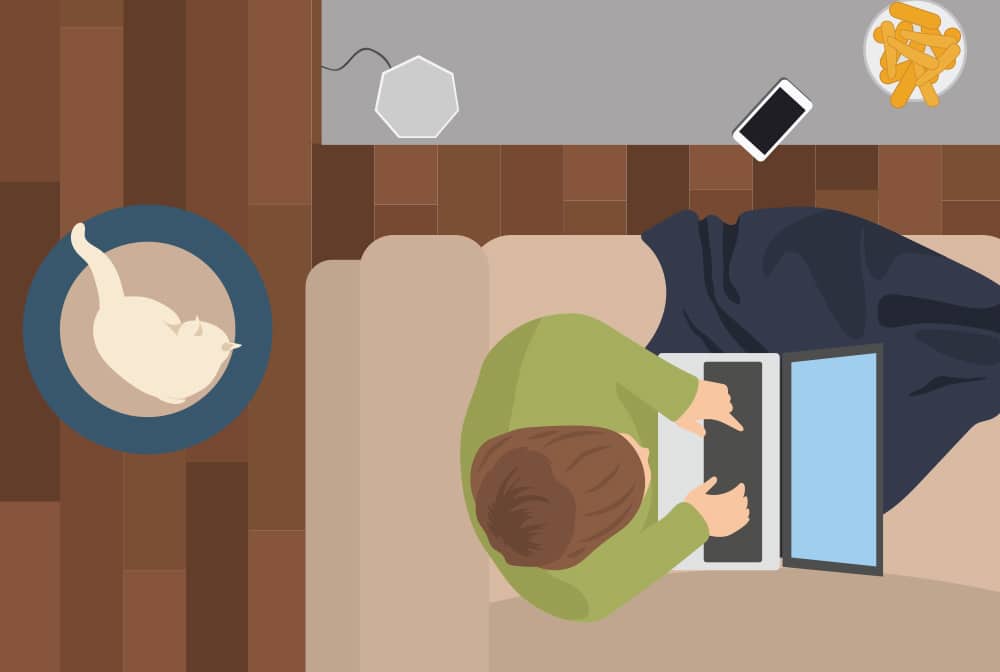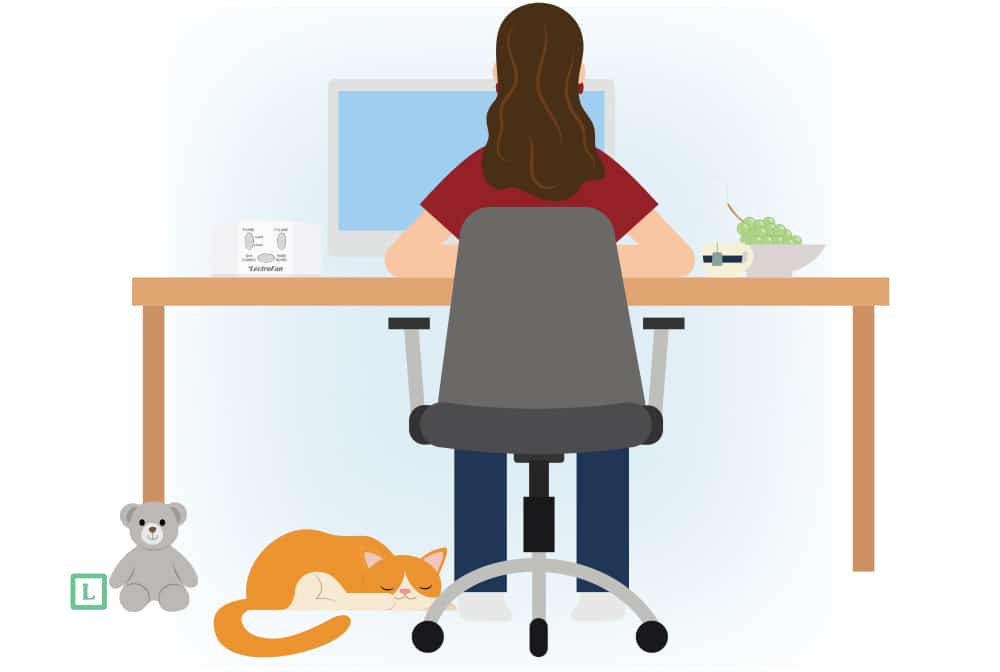
Using White Noise to Improve Your Work Environment
Quick Summary:
- There’s nothing wrong with having trouble staying focused. Evolution is working against us.
- There’s a reason why your home can be a more distracting work environment than an office or even a coffee shop
- White noise is a key scientific method for mitigating these issues
- White noise is widely used by psychiatrists and psychologists
- Work-life balance is more than making sure you make time for both
Finding and maintaining focus isn’t something that comes easily to all of us. And even for those lucky few for whom it normally does, concentration is something that waxes and wanes on different days and at different points within a given day. Why is it that we always have the most difficulty staying on task when it’s most critical that we get things done in a timely manner?
For those of us who work at a computer, whether in an office or at home, it’s almost certain that completing our daily work tasks requires us to stay focused for a substantial part of our day. On good days, it seems we’re able to tackle task after task with relative ease. On other days, however, completing as much as a single task can feel like an impossible struggle.
Why Staying Focused Can Be So Difficult
There are many reasons why our brains can fall short in the “focus” department. Factors like fatigue, stress, and illness, for example, can easily become roadblocks to completing work. It’s safe to say that our bodily functions aren’t primarily concerned with making sure we get through our to-do list. When we don’t get enough sleep, our body spends the following day dwelling on the fact that it didn’t get the time it needed to heal itself and restore its chemical balance. When we’re overly stressed or anxious, our mind becomes forgetful and our thinking process gets foggy. And the days when these issues are compounded are the days when our battle with productivity feels hopeless.
A 2015 study by Microsoft Canada found that the average “knowledge worker” spends about two work hours per day being distracted and then trying to refocus. It also found that the average attention span is only eight seconds, down from twelve seconds only five years earlier. The way that we consume media in today’s world is partly responsible for this. We’re constantly inundated with new information, much of it not critical to our day-to-day survival — something our ancestors (with much longer, pre-internet attention spans) had to be far more concerned with and aware of. But, our brains are still wired to not let us get too engrossed in activity that we shut out the world. Today, that distraction might be a phone or a pet. Millenia ago, it might have been a predator that wasn’t interested in waiting for us to finish what we were doing before we became their lunch.
That being said, both our short and long-term professional success often rests on our ability to accomplish tasks successfully and on time. Some factors we can’t help. And that’s completely okay. We shouldn’t beat ourselves up for being human! On particularly difficult days, we should allow ourselves to rest, catch up on sleep, and push our tasks to another day. Luckily, however, there are factors that we can assert some control over with simple lifestyle changes and appropriate planning.
Small Changes That Can Help
Adjusting our physical environment is one of the many ways that we can take more charge of our levels of concentration throughout the day. We can keep our phones out of reach and internet disconnected if the task at hand doesn’t require it. We can attempt to make our workstation feel more peaceful, whether that means bringing in plants, decluttering, or adjusting our lighting. We can take walks and schedule breaks throughout the day. And of course, we can manage the sounds around us to the best of our ability.
The Sounds That Rule Our Work Days
Our brains are designed to notice, recognize, and decipher all kinds of sounds around us, which then compete for our attention. When we hear one-sided phone conversations from our coworkers, partners, or roommates, for example, they can be both distracting and annoying. Science tells us that it’s because our brain immediately jumps to break down exactly what the conversation is about. Sound distractions essentially function the same way everywhere: it’s not necessarily noise itself that breaks our focus, but rather sudden changes in our audible environment. That’s part of the reason why so many people who work from home prefer going to coffee shops. They aren’t quiet, but all the competing noises create an ocean of sound where (ideally) no particular conversation is intelligible. White noise works in a very similar way. In short, it gives your brain a specific and consistent noise to focus on.
Working from home, which many of us are doing for the first time, can blur the lines between our personal and professional lives in ways that make us less focused, and more tense. Learning to share our work space with partners, family members, or roommates is never easy, especially when more than one of us is using our home as an office. At any point in our day, we may get distracted by the sounds of children playing, roommates taking Zoom meetings, or dogs barking. Listening to white noise as we work can help mask those noises and make them less perceptible.

What We Can Learn From Therapists
Therapists have long relied on the benefits of white noise when it comes to protecting the privacy of their clients. Client confidentiality — the idea that whatever is said during a therapy session will stay there — is the single most important agreement between therapists and psychiatrists and the people they serve. That’s why so many of them opt for using white noise in their waiting rooms. White noise makes conversations between them and clients in active sessions unintelligible. Any dialogue will more or less sound like gibberish to those in the waiting room. And that’s exactly why white noise can help optimize the sound we hear throughout our work day.
White Noise Can Help Improve Memory
Having a white noise machine in our homes can help create a better and more consistent work environment in several ways. Aside from decreasing noise-related disruptions during our daytime work hours, white noise can also reduce fatigue, improve overall concentration, and help memory when used at night.
When used as background noise during our sleep hours, white noise can help us achieve deeper sleep for longer periods of time, which is critical to maintaining a healthy memory. Slow-wave sleep (or deep sleep) is indispensable when it comes to memory consolidation and unfortunately, something many of us don’t get enough of. This is especially true for people who, for whatever reason, have an especially difficult time falling and staying asleep. Studies have shown that people who use variations of white noise perform better on memory tests than they do on other nights. So, staying focused throughout our day is both about how much sleep we get and the quality of that sleep.
The Open Office Dilemma
For those of us who normally work out of an office (particularly an open plan office), the same general noise issue arises but with different types of sounds. When the open office plan took over the 21st century workplace, replacing sound-blocking cubicles, the idea was that it would increase creativity and collaboration. But many workers find themselves far too distracted by neighboring chatter to get their work done. Blasting white noise through a speaker may not be the best idea, particularly if you haven’t checked in with your coworkers. But listening to white noise through earphones can be an excellent way to combat sound distractions.
Aiming to Unplug in Peace
For the better part of our population, at least some of the stress that rules our lives is tied to looming (and ever-growing) to-do lists and work demands. Whether you’re new to the “work from home” life or a seasoned vet, it’s important that you strive to find that elusive healthy work-life balance everyone talks about but few seem to find. And part of that means getting enough of your work done during allotted work hours to be able to unplug outside of them. It’s not just limiting yourself to a certain amount of work time, but taking steps to improve your focus when you’re working. When you’re done with what needs to be done and you’re spending quality time, you can step away from work without thinking about work.

Don't just take our word for it.
We don’t take the term “sleep like a baby,” lightly. We know you don’t either. Want advice from a baby whisperer? Our sleep trainers understand.







